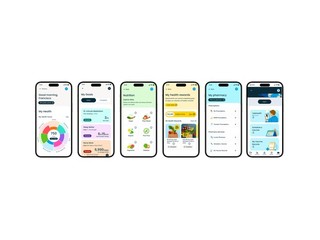 In 2021, 33.8 million Americans, including 9.3 million children, lived in food-insecure households. Minority households are disproportionately impacted, with food insecurity rates of 16.2% for Latinx households and 19.8% for Black households, more than double and nearly triple, respectively, the 7% rate for White households.
In 2021, 33.8 million Americans, including 9.3 million children, lived in food-insecure households. Minority households are disproportionately impacted, with food insecurity rates of 16.2% for Latinx households and 19.8% for Black households, more than double and nearly triple, respectively, the 7% rate for White households.
One of the goals of the Biden administration has been to put an end to hunger and reduce diet-related diseases by 2030, with efforts that have included the White House Conference on Hunger, Nutrition, and Health, which involved an $8 billion package committed to both the private and public sector.
On Friday, the administration announced another initiative with the aim of achieveing its goal: called the White House Challenge to End Hunger and Build Healthy Communities, it encourages organizations and communities “to participate by making bold and impactful commitments” in one or more of it five pillars. Those include: improving food access and affordability, integrating nutrition and health, empowering all consumers to make and have access to healthier choices, supporting physical activity for all, and enhancing nutrition and food security research.
While the White House said it is going to work with the President’s Council on Sports, Fitness, and Nutrition to shore up commitments, with announcements of those participants in the fall of this year, it also revealed a number of companies, non-profits, philanthropic groups, and local elected-officials that have already joined.
That includes companies in the tech sector, most notably Instacart, which announced it would be partnering with Boston Children’s Hospital, along with at least four other major health care providers to create virtual food pharmacies and other food is medicine interventions using Instacart Health products within he next six months.
Instacart had previously worked with the White House when it debuted Instacart Health last year in coordination with the White House Conference on Hunger, Nutrition and Health.
Instacart Health involves a series of new products, partnerships, and policy commitments, with the aim of making sure that every person has access to nutritious food, including Fresh Funds, which allow organizations, including nonprofits, insurance companies, and employers, to provide funds for people to buy nutritious food from grocery retailers on the Instacart App.
Another product it launched was Care Carts, which are designed to give healthcare providers and caregivers the ability to order groceries on behalf of someone else; for example, a clinician might want to deliver groceries for a patient’s prescribed meal plan. The company also launched Health Tags, which let customers view up to 23 item-level labels, including low-salt, low-sugar, keto, gluten-free, while they shop on Instacart.
In a blog post, Instacart revealed that its partnership with Boston Children’s Hospital part of a broader expansion of Instacart Health, including a new product suite aimed at providers. That includes building custom virtual store fronts for any hospital or health system in the country in order to help providers educate and inspire patients to make better food choices.
“Instacart Health’s provider products are designed to enhance collaborative care, promote healthy choices and deliver nutritious foods to patients across the country. Through Instacart Health, we’re giving providers the tools required to build virtual food pharmacies and deliver actionable nutrition advice to their patients through our platform,” Sarah Mastrorocco, Vice President and General Manager of Health for Instacart, wrote.
The company will also be launching four new studies with researchers at Mount Sinai Hospital; University of Kentucky; University at Buffalo; and the Stanford Cancer Institute, Food for Health Equity Lab at Stanford Medicine, and the University of California, San Francisco’s Helen Diller Family Comprehensive Cancer Center to study the impact of nutrition security interventions and food is medicine services on different patient groups, including individuals living with low incomes.
Other companies that have partnered with the White House include DoorDash, which said it would give its users the ability to make healthy choices by growing the availability of produce in its marketplace through partnerships with local, regional and national grocers by 2025. It will also promote and highlighting healthy products on its platform through tags and filters, while working with USDA to offer access to SNAP EBT grocery delivery.
Another partner is SHIPT, which launched a new accelerator program, LadderUp, to provide 10 local retailers with capital, e-commerce focused technical assistance, and education, with program participation aiming for at least 50% being in the food, beverage, and grocery categories, and 50% of businesses being owned by people of color and LGBTQI+ people.
(Image source: health.clevelandclinic.org)

















